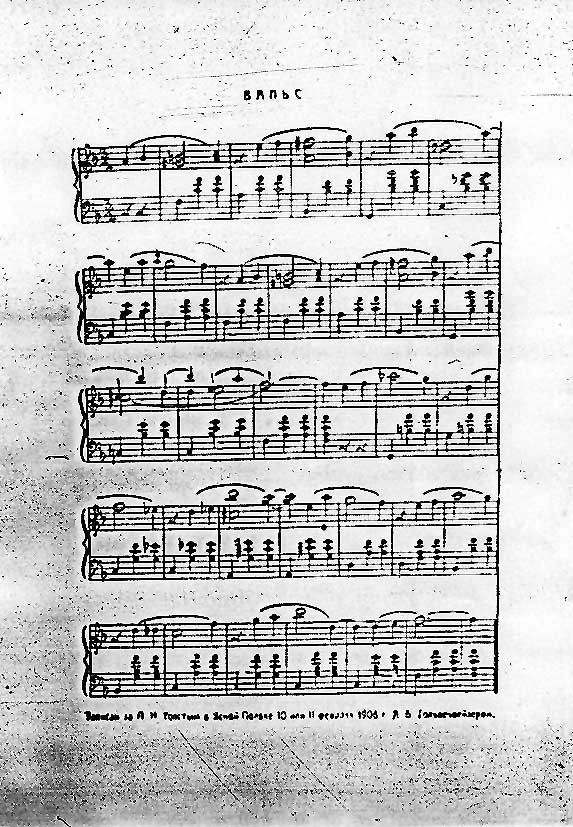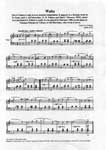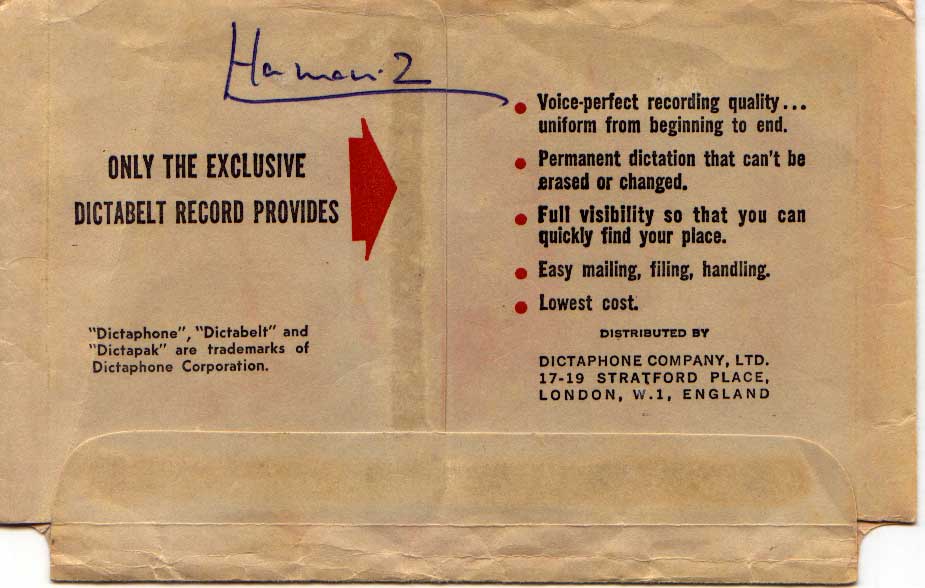Confessions of an Editor
Henry Hardy
This piece, which originated as a talk given first at the Harvard Club in New York on 2 June 1998 and then, with expansions, at Wolfson College, Oxford, on 8 March 2000, was published on 30 June 2000 in the Australian Financial Review, Review section, pp. 4–5
When Tom Stoppard was asked some years ago in an interview why he was a playwright, he replied that his trade was the natural outlet for a person who was congenitally incapable of seeing only one side of any question. By writing dialogue between dissenting characters he could put forward more than one point of view at once, without having to express a preference or make a decision between them. Being a playwright, as he once put it, allows him to contradict himself in public with impunity.
Alistair Cooke, it emerges from the recent biography by Nick Clarke, is motivated by a similar philosophy in his choice of occupation. As a journalist he is free to compose vivid portraits of radically opposed attitudes, bringing out the point of each of them, and is not obliged to plump for one to the exclusion of the others. He once told Nehru: ‘my trouble about going into politics is that I was brought up to believe there’s so much to be said on both sides. What I find when I’m reporting with any kind of seriousness, there’s much to be said on three, four or five sides.’ [1]
This is probably the kind of stance that will intensely irritate many people of a scientific temperament, but I am convinced that it is (or ought to be) a quite general feature of much of the landscape in the humanities. Wherever critical judgement has a role, or value judgement, there is no single right answer, despite the pretence that there is on the part of those academic grandees who write letters to the TLS fulminating that anyone of the meanest intelligence can see that any view of the matter in hand other than their own is beneath contempt. Marina Warner captured this kind of indeterminacy well, as it applies to politics, in a recent interview when she said: ‘I find that if I read in the New York Review of Books a piece about how we should go into Kosovo with a land army I’m completely convinced. And then I read somewhere else that it’s a disgraceful act of colonisation and imperialism for our trade benefits, and I’m equally convinced.’ [2]
The same point is present in a more jocular remark that Isaiah Berlin used to make about the famous occasion when Irving Berlin was mistakenly invited in his place to lunch with Winston Churchill: ‘There are many versions of this story – all true.’
The feeling that one is caught between two or more equally valid ways of looking at a situation is a generalised version of what Berlin, in his Romanes Lecture of 1970 on Turgenev, called ‘the liberal predicament’ – the predicament of the moderate, gradualist liberal, poised uncomfortably midway between the reactionaries and the radicals. It is the position of all those who refuse to see issues in black-and-white terms, and inevitably leads to their being exposed to charges of indecision, sitting on the fence, lack of commitment. I shall ask you to listen to Berlin describing this predicament in his own voice and words a little later, but at present I want to suggest, rather tendentiously perhaps, and at the risk of comparing the sublime with the ridiculous, that there is something of the liberal predicament in the temperament of an editor. (One might perhaps make a somewhat analogous point about the biographer.)
I should say here in parenthesis that ‘editor’ is a capacious word – perhaps over-capacious – and covers a very heterogeneous range of activities. The editor of a newspaper is hugely different from a publisher’s copy-editor, despite a certain dimly discernible family resemblance. So I should perhaps make clear that these ‘confessions’ relate to the editing of books – and especially to the process of bringing into existence books that would otherwise not have appeared.
This kind of editor, at any rate, is someone who feels more comfortable saying ‘Look at what this person thinks’ than saying ‘Here is what I think.’ By serving as an intellectual midwife, by helping to present the views of others rather than trying directly to arrive at views of his own, he frees himself from the immediate responsibility for evaluating these views, for deciding whether he shares them himself – though he will naturally prefer to be involved with work he finds sympathetic. This second-order role is congenial to someone who is often immediately aware, if he tries to put forward a position, that he might with just as much conviction be putting forward its opposite. At any rate, that has been part of my own experience, and it is reinforced by what may be a form of intellectual cowardice, namely a reluctance to stand in the firing line when one might instead position oneself a step behind the gunners and offer practical support. There is often a crucial role for such persons in the literary endeavour, even if it is not a role likely to excite the highest admiration. But it is a role that can bring enormous satisfaction, fortunately, even if those of other temperaments find it hard to imagine how this could be so.
And my suspicion is that most people do indeed find it hard to imagine. The editor is a strange, shadowy, parasitic creature, and those not smitten with the peculiar eccentricities of character that make editorial work attractive find the editor’s calling puzzling, or just plain dull. This is hardly surprising, and in a way it is as it should be, since the editor’s proper role is to be for the most part out of sight and out of mind, a back-room boy. Someone once said that the best editor is the most invisible – perhaps I said it myself, though I rather doubt it. At all events, it is true: a well-edited book, like a book with a good typographical design, does not wear on its sleeve most of the work that has been put into it; it is a badly edited book that best reveals why the editor is required. Of course it isn’t possible wholly to conceal the editorial presence, as in the case of the three dots, or ‘ellipsis’, used to mark omissions, which Tolkien once called ‘the trail of the passing editor’; there is also, sometimes, the footnote: but these are only the tip of the invisible iceberg of the work the editor has to do.
The saintly editor would perhaps not make his identity public at all. Such is the practice, oddly, of the editors of most of our daily newspapers, though I doubt whether saintliness has much to do with this, since the identities of these editors are after all no secret. But in the case of books the editor’s name conventionally appears on the title page. Even so, it often passes unnoticed, reasonably enough, since it is the author on whom the reader’s attention is focused. The most triumphant example of this in my own experience was when an uncle of mine once strongly recommended to me Isaiah Berlin’s book Personal Impressions as if I might not have come across it. Not only was I named as editor in the book, but I had given my uncle his copy as a present. I accepted his recommendation with outward grace.
In the case of Isaiah Berlin there is a special reason for revealing the existence of an editor, and this is that it is also a way of indicating Berlin’s attitude to his own work. Oddly enough, I have never been asked why Berlin needed an editor: after all, he was only in his sixties when I began work, in the mid-1970s. Perhaps the question does occur to people, but seems impolite. However that may be, one answer to the question is that Berlin was incorrigibly modest about the quality and importance of his work, and would have been constitutionally incapable of putting in hand on his own account the series of volumes that I have been fortunate enough to edit. For a start he thought it too self-regarding to publish collections of scattered essays on one’s own initiative when one should really be writing solid new works of scholarship. He had made exceptions for Four Essays on Liberty and for Vico and Herder, though even there the path to publication was long and stormy, as the publishers involved could testify with feeling. But he felt he ought to finish his long-projected book on romanticism, based on the Mellon Lectures that he gave in Washington in 1965, rather than working on further collections, and he certainly wasn’t looking for an editor to take on this latter task. I am not clear exactly why he agreed to my proposal that I should edit the collections for him, since he had turned down a number of similar proposals from other quarters, but it may have been partly due to a growing realisation that the completion of the romanticism project was some way off, at best. (In the end he never did make real progress with it, and a year ago I published an edited transcript of the lectures as they were delivered, under the title The Roots of Romanticism.) At any rate, the fact that a share of the public responsibility would be taken by an editor (who could perhaps be blamed in the event of a poor critical reception!) meant that he wouldn’t feel he was putting himself forward quite as he would have been if he had organised publication himself; indeed, he used to refer to the volumes I edited as his ‘posthumous writings’, highlighting the passivity of his own role.
People who are unaware of this background sometimes assume that Berlin simply took me on as a sort of research assistant to help with the drudgery of a pre-existing project. There was indeed a great deal of drudgery – more than was good for me, perhaps – but that wasn’t the point. On the contrary, he had to be cajoled at every stage to allow matters to progress, and never took the initiative. Once the project was conceived, my first task was to try to track down what he had written, which was difficult enough, since he had no list of his publications, either mental or physical, and no systematic collection of offprints or photocopies. Even now I am sure there are items I haven’t discovered. Then I had to read everything and construct possible volumes for his approval. Even after the first four linked volumes had appeared and met with enormous critical acclaim, it became no easier to persuade him to authorise other volumes, and a gradual process of attrition was required, even in the case of the last new volume published in his lifetime, The Sense of Reality. I remember in particular showing him the typescript of the wonderful title essay of that volume when I had come across it in a dusty corner of his study: ‘Are you sure it’s by me?’ he asked. In short, he sincerely believed, and constantly insisted, that his work was over-estimated; he genuinely did not see himself as a world-class thinker, or indeed as a person of any special significance; he did not regard his work as amounting to a statement of any kind of overall position or outlook; and although the transforming effect on his reputation of the volumes he allowed me to edit gave him pleasure, the pleasure was always overshadowed by a degree of uneasiness that he would at some point be found out, exposed as an intellectual fraud of some kind. He never expected or hoped for the enthusiastic response that greeted these volumes, let alone his treatment in the latter part of his life as a great man and a fount of wisdom. Nevertheless, and even if there has been a certain amount of hype, his readers’ assessment of his achievement has in my view been nearer the mark than his own.
*
A detailed description of the general run of my editorial work would not provide very appetising fare for an audience of normal, healthy human beings. (Who would welcome a lecture on Berlin’s use of the colon, or on techniques for tracing unreferenced quotations?) But I thought it might be briefly diverting if I were to share with you a couple of special moments. The first and best of these moments was the discovery of the missing portion of Berlin’s study of the obscure Prussian thinker Johann Georg Hamann, published in 1993 as The Magus of the North. I must apologise to anyone who has already heard a version of this story on Radio 3, in a programme broadcast soon after Berlin’s death; but I cannot resist telling it again.
Hamann was extremely important to Berlin as a crucial instigator of the romantic reaction against the eighteenth-century Enlightenment. I knew that Berlin had given lectures on Hamann, and I knew from the files of the Hogarth Press that he had at one time intended to publish a long essay on him in a book which never materialised. I asked him more than once whether such an essay existed, as he had told his publishers it did, but he always denied it. One day, however, at his home in Headington I came across some folders of material on Hamann which contained very large portions of what was obviously exactly this essay, in a fairly advanced stage of preparation. Unfortunately the rough typescript stopped at the bottom of a page in the middle of one of the central chapters with the words ‘Why are we here? What is our goal? How can we allay the . . .’.
This was extremely frustrating: I knew that if I could find the missing section we could make a book, and if I couldn’t, we couldn’t. Some time later, when I was searching for papers in his cellar, I came across a dusty brown envelope marked ‘Hamann’. Inside it there were several ‘Dictabelts’, as they are called, red plastic recording belts which were used in the 1950s and ’60s in Dictaphone machines.

The last page of the main typescript
of ‘The Magus of the North’:
click on image to enlargeIt may be that others are interested in the facts for their own sake, to satisfy their curiosity; and invent or study sciences in order to satisfy this same curiosity; or perhaps they do so in order the better to control material forces; all this may be so, but to him this seems trivial beside the need to answer the ultimate questions – Why are we here? What is our goal? How can we satisfy – how can we allay the spiritual agony of those who will not rest unless they obtain true answers to these questions? ...3,500 words of the missing chapter follow, not to mention a large chunk of the next chapter which I didn’t know was missing. You can imagine my excitement. In the end, after a great deal of reconstructive surgery, the book appeared. Having completely forgotten that he had written any such work, Berlin was astonished and I think grateful when it finally saw the light. In my view it is not only its bizarre origins that make it special: of all the books published in his lifetime, I think it has most nearly the immediacy of his famous unscripted lectures, because it was not subjected to the repeated expansions and revisions that sometimes blurred the outlines of other essays of his. It remains, indeed, essentially as it was first dictated. That too is to me an astonishing fact: here is an entirely fluent book which was more or less dictated extempore from notes.Once the Dictabelt problem had been solved, other Dictabelts that turned up could be transferred to cassette, and some of these were of the greatest possible interest. I’ve chosen just one more to play now, since it preserves the moment in 1958 when Berlin was dictating for his secretary his most important essay, his inaugural lecture as Professor of Social and Political Theory at Oxford, ‘Two Concepts of Liberty’. As you will hear, this precise title was arrived at only at the very last moment.
Inaugural Lecture: ‘Two Concepts of Freedom’ – no, ‘of ...’ – no, ‘of Liberty’, sorry. Begins.I have two more short samples of Berlin’s voice to play you. I thought you might find it poignant, as I do, to hear, first, one of the earliest recordings of his voice in my possession, and then the latest recording that exists. The earliest surviving recording of all dates from 1952, but this belongs to the BBC, whose rules prevent me copying it and playing you a sample. The earliest I have available are four or five years younger, and I have chosen one from 1957, when Berlin read on the radio his translation of Turgenev’s short autobiographical story, ‘A Fire at Sea’, in which Turgenev relates how he tried to bribe a sailor for a place in a lifeboat when a ship he was travelling on caught fire. The story was preceded by an introduction in which Berlin discussed the reluctance of a person like Turgenev with liberal sensibilities to take up firm positions. For some reason this passage was omitted from the published version of the piece, though its theme resurfaced in the Romanes Lecture to which I have already referred. It has clear autobiographical resonance for Berlin [listen]:
Mr Vice-Chancellor, the subject to which my Chair is dedicated – social and political theory – has fallen upon evil days in this country. It is a melancholy reflection that in the land which has made a great, perhaps the greatest, contribution to political thought, among a people which still feels a legitimate pride in the names of Hobbes, Locke, Hume, Mill, Green, Bradley, so few men of [inaudible] and capacity for theoretical thought should today wish to deal with social or political ideas.All his life Turgenev was suspected by his friends of having a weak character, of being a coward, of not daring to come to either side, of sitting on a fence, above all of showing a certain lack of spirit in crises, whether personal or moral or political, or whatever kind. He never exactly defended himself against these charges, except rather half-heartedly; but that he minded them very strongly is very clear from everything that we know about him, and particularly his correspondence. His whole life was spent in trying to explain that someone like him who has a realistic grasp of the truth cannot take sides with the kind of fanaticism and whole-heartedness with which people with a narrower and more intense vision could, and that he was simply being punished for a just view of the facts, for being moderate, for having a certain amount of insight and human sympathy.The voice changed enormously in later years, especially after one of Berlin’s vocal cords became partly paralysed. In July 1997, shortly before his last illness, he gave a final interview to Ramin Jahanbegloo, who had published a volume of conversations with him six years earlier. As far as I know, his voice was never recorded again. Unfortunately, the technical quality of the recording is terrible, but here is part of what Berlin said about life and death:I had a very good life. Absolutely. On my deathbed I can say I’ve had a very interesting life, I’ve had a very good life – I did, certainly ...I should like to finish with an extremely short piece of music. It is quite unconnected with what I’ve been saying, except that it is another instance of the unpredictable rewards of being Berlin’s editor. When Humphrey Carpenter interviewed Berlin for his history of the Third Programme and Radio 3, The Envy of the World, Berlin happened to mention, quite incidentally, that Tolstoy had written a waltz. Carpenter gave me a copy of the tape of this interview, and this remark made me very curious to track down the waltz. Eventually I found it in an obscure Russian book in Berlin’s library on Tolstoy and music. One of the authors of the book had known Tolstoy, it turned out, and on a visit to his house at Yasnaya Polyana when Tolstoy was an old man, Tolstoy had played the waltz, which he had written when he was young. It was the only time the author had heard Tolstoy play. Luckily, it seems he had an exact memory, and he wrote the piece down. It appears at the back of the book in a handwritten form that is very hard to read. My brother (a composer) kindly edited it and printed it out properly on a computer, and after various false starts I arranged for the pianist Imogen Cooper to record it – so far as I knew, it had never been recorded before, or even played in public. A CD of her recording reached Berlin the day before he died. For that reason I always hear it as a sort of valedictory signature tune evoking the memory of the most remarkable man I have ever known. It also seems to me to have a special simple sweetness of its own, though it lasts less than a minute. Here it is.... I’m not afraid of death. The process of dying may be rather painful, but apart from pain, if a brick fell on me quite suddenly, that would be all right. You know what Herzen said about the purpose of life? The purpose of life is life. That’s my motto. Otherwise, he says, if the purpose of life is what life is marching towards, its purpose is death. We don’t say that – the purpose of life is life. When life ceases, nothing is worth talking about.

The manuscript of Tolstoy’s waltz,
copied down by A. Gol’denveizer
after hearing Tolstoy play it:
click on image to enlarge
John Hardy’s edition of Tolstoy’s waltz:
click on image to enlarge
[rights information]
1. From Nick Clarke’s transcript of one of his conversations with Cooke. See also his Alistair Cooke: The Biography (London, 1999), p. 365. [back] Notes
2. Guardian, 22 January 2000, Saturday Review, p. 7. [back]
© Henry Hardy 2000
John Hardy’s edition of Tolstoy’s Waltz © John Hardy 1996
Performance of Tolstoy’s Waltz © Imogen Cooper 1997


